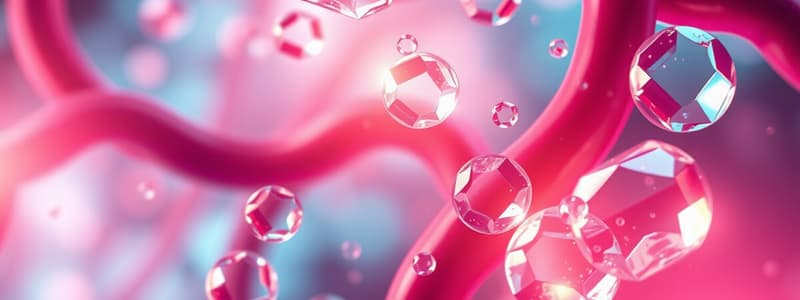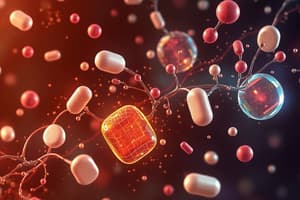Podcast
Questions and Answers
The most common adverse effect of angiotensin-converting enzyme (ACE) inhibitors is dehydration.
The most common adverse effect of angiotensin-converting enzyme (ACE) inhibitors is dehydration.
False (B)
The rate of death due to cardiovascular-related diseases has dropped significantly over the past 20 years.
The rate of death due to cardiovascular-related diseases has dropped significantly over the past 20 years.
True (A)
Women in all ethnic groups experience more hypertension than men.
Women in all ethnic groups experience more hypertension than men.
False (B)
Hypertension has a heredity component, with family members of hypertensives having a greater risk of this disease than non-family members.
Hypertension has a heredity component, with family members of hypertensives having a greater risk of this disease than non-family members.
Alpha-adrenergic blockers lower blood pressure by dilating the smooth muscle in arterioles.
Alpha-adrenergic blockers lower blood pressure by dilating the smooth muscle in arterioles.
The most common class of drugs used to treat hypertension is the direct-acting vasodilators.
The most common class of drugs used to treat hypertension is the direct-acting vasodilators.
What is the most common type of hypertension, accounting for 90% of all cases?
What is the most common type of hypertension, accounting for 90% of all cases?
As cardiac output increases, what happens to the blood pressure?
As cardiac output increases, what happens to the blood pressure?
How does angiotensin II raise blood pressure?
How does angiotensin II raise blood pressure?
Calcium channel blockers cause the smooth muscle in arterioles to _________________, thus ___________________ blood pressure.
Calcium channel blockers cause the smooth muscle in arterioles to _________________, thus ___________________ blood pressure.
ACE Inhibitors, such as captopril (Capoten), reduce blood pressure by lowering levels of what?
ACE Inhibitors, such as captopril (Capoten), reduce blood pressure by lowering levels of what?
What is the condition called that occurs when the heart rate increases due to the rapid fall in blood pressure created by a drug?
What is the condition called that occurs when the heart rate increases due to the rapid fall in blood pressure created by a drug?
The adverse effects of adrenergic blockers are generally predictable, because they are usually extensions of the ______________ response.
The adverse effects of adrenergic blockers are generally predictable, because they are usually extensions of the ______________ response.
What is the classification of Clonidine (catapres)?
What is the classification of Clonidine (catapres)?
What type of drug is Captopril (Capoten)?
What type of drug is Captopril (Capoten)?
What type of drug is Spironolactone (Aldactone)?
What type of drug is Spironolactone (Aldactone)?
What type of drug is Diltiazem (Cardizem)?
What type of drug is Diltiazem (Cardizem)?
What type of drug is Losartan (Cozaar)?
What type of drug is Losartan (Cozaar)?
What type of drug is Verapamil (Calan)?
What type of drug is Verapamil (Calan)?
What type of drug is Lisinopril (Prinivil, Zestril)?
What type of drug is Lisinopril (Prinivil, Zestril)?
What type of drug is Hydrazine (Apresoline)?
What type of drug is Hydrazine (Apresoline)?
What type of drug is Metoprolol (Toprol)?
What type of drug is Metoprolol (Toprol)?
What type of drug is Hydrochlorothiazide (Microzide)?
What type of drug is Hydrochlorothiazide (Microzide)?
Which drug lowers blood pressure primarily by increasing the renal excretion of sodium and water?
Which drug lowers blood pressure primarily by increasing the renal excretion of sodium and water?
Which drug is a cardioselective beta 1-blocker?
Which drug is a cardioselective beta 1-blocker?
A blood pressure of 138/83 mmHg in a patient over 80 years old with no compelling indications would be considered?
A blood pressure of 138/83 mmHg in a patient over 80 years old with no compelling indications would be considered?
All of the following are primary factors responsible for blood pressure except?
All of the following are primary factors responsible for blood pressure except?
A persistent, dry cough is a common side effect of therapy with?
A persistent, dry cough is a common side effect of therapy with?
Which drug class is NOT commonly used to treat hypertension?
Which drug class is NOT commonly used to treat hypertension?
Which drug class contains first-choice drugs for treating mild to moderate hypertension because they act on the kidney tubule to block reabsorption of sodium?
Which drug class contains first-choice drugs for treating mild to moderate hypertension because they act on the kidney tubule to block reabsorption of sodium?
When assessing laboratory tests, the health care provider should know that hyperkalemia is a common adverse effect of therapy with?
When assessing laboratory tests, the health care provider should know that hyperkalemia is a common adverse effect of therapy with?
Calcium channel blockers used for hypertension act by blocking calcium ion channels in?
Calcium channel blockers used for hypertension act by blocking calcium ion channels in?
Which drug class inhibits the secretion of aldosterone?
Which drug class inhibits the secretion of aldosterone?
Which drug classes are used to treat hypertension?
Which drug classes are used to treat hypertension?
When assessing the patient, the healthcare provider should know that bradycardia is a common adverse effect with?
When assessing the patient, the healthcare provider should know that bradycardia is a common adverse effect with?
Which drug would be prescribed on an emergency basis to lower extremely high blood pressure within minutes?
Which drug would be prescribed on an emergency basis to lower extremely high blood pressure within minutes?
Flashcards are hidden until you start studying
Study Notes
General Information about Hypertension
- Cardiovascular-related death rates have significantly declined over the past 20 years.
- Family history contributes to a higher risk of developing hypertension.
Types of Hypertension
- Primary (essential) hypertension accounts for 90% of all hypertension cases.
Drug Classes and Mechanisms
- Alpha-adrenergic blockers reduce blood pressure by dilating smooth muscle in arterioles.
- ACE Inhibitors lower blood pressure by decreasing angiotensin II levels and can cause a persistent dry cough as a side effect.
- Calcium channel blockers relax smooth muscle in arterioles, thereby reducing blood pressure by blocking calcium channels in vascular smooth muscle.
- Diuretics, such as hydrochlorothiazide and furosemide, lower blood pressure by increasing renal excretion of sodium and water and are first-choice for mild to moderate hypertension.
Specific Drugs
- Captopril and Lisinopril are examples of ACE inhibitors.
- Clonidine functions as a centrally acting alpha2-adrenergic agent.
- Spironolactone is a diuretic and inhibits the secretion of aldosterone, which can cause hyperkalemia as a side effect.
- Diltiazem and Verapamil are calcium channel blockers.
- Nitroprusside is employed in emergencies to rapidly lower extremely high blood pressure.
Adverse Effects
- Reflex tachycardia may occur due to a rapid fall in blood pressure from medications, stimulating an increased heart rate.
- Adrenergic blockers can produce predictable adverse effects that are generally extensions of the fight or flight response.
- Bradycardia is a common side effect associated with selective beta 1-blockers.
Key Blood Pressure Facts
- Blood pressure rises with increased cardiac output.
- Angiotensin II elevates blood pressure by enhancing peripheral resistance.
- A systolic value of 138 mmHg and diastolic value of 83 mmHg in an elderly patient is considered normal.
- Venous pressure is not a primary factor influencing blood pressure.
Misconceptions and Clarifications
- Not all women experience more hypertension than men across all ethnic groups.
- Direct-acting vasodilators are not the most commonly used class for treating hypertension.
Medications Overview
- Metoprolol is classified as a beta 1-blocker.
- Common diuretics include Hydrochlorothiazide for hypertension management.
Studying That Suits You
Use AI to generate personalized quizzes and flashcards to suit your learning preferences.




